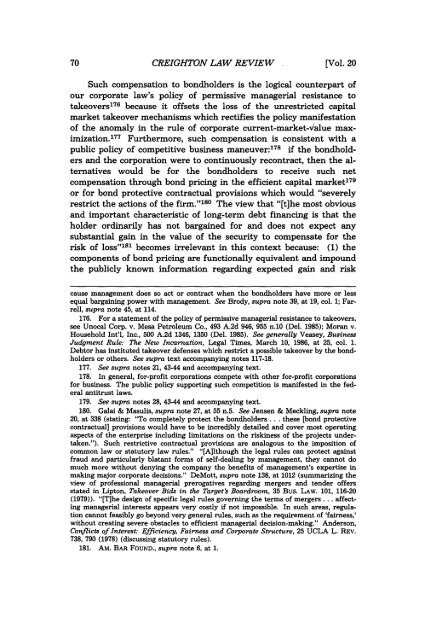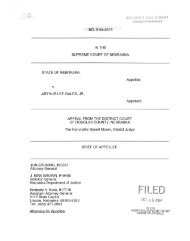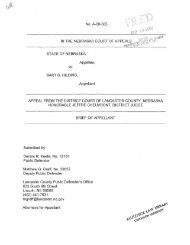Financial Articulation of a Fiduciary Duty to Bondholders with ...
Financial Articulation of a Fiduciary Duty to Bondholders with ...
Financial Articulation of a Fiduciary Duty to Bondholders with ...
Create successful ePaper yourself
Turn your PDF publications into a flip-book with our unique Google optimized e-Paper software.
CREIGHTON LAW REVIEW [Vol. 20<br />
Such compensation <strong>to</strong> bondholders is the logical counterpart <strong>of</strong><br />
our corporate law's policy <strong>of</strong> permissive managerial resistance <strong>to</strong><br />
takeovers 176 because it <strong>of</strong>fsets the loss <strong>of</strong> the unrestricted capital<br />
market takeover mechanisms which rectifies the policy manifestation<br />
<strong>of</strong> the anomaly in the rule <strong>of</strong> corporate current-market-Value maximization.<br />
177 Furthermore, such compensation is consistent <strong>with</strong> a<br />
public policy <strong>of</strong> competitive business maneuver: 178 if the bondholders<br />
and the corporation were <strong>to</strong> continuously recontract, then the alternatives<br />
would be for the bondholders <strong>to</strong> receive such net<br />
compensation through bond pricing in the efficient capital market 179<br />
or for bond protective contractual provisions which would "severely<br />
restrict the actions <strong>of</strong> the firm.' 8 0 The view that "[tjhe most obvious<br />
and important characteristic <strong>of</strong> long-term debt financing is that the<br />
holder ordinarily has not bargained for and does not expect any<br />
substantial gain in the value <strong>of</strong> the security <strong>to</strong> compensate for the<br />
risk <strong>of</strong> loss"'' 1 becomes irrelevant in this context because: (1) the<br />
components <strong>of</strong> bond pricing are functionally equivalent and impound<br />
the publicly known information regarding expected gain and risk<br />
cause management does so act or contract when the bondholders have more or less<br />
equal bargaining power <strong>with</strong> management. See Brody, supra note 39, at 19, col. 1; Farrell,<br />
supra note 45, at 114.<br />
176. For a statement <strong>of</strong> the policy <strong>of</strong> permissive managerial resistance <strong>to</strong> takeovers,<br />
see Unocal Corp. v. Mesa Petroleum Co., 493 A.2d 946, 955 n.10 (Del. 1985); Moran v.<br />
Household Int'l, Inc., 500 A.2d 1346, 1350 (Del. 1985). See generally Veasey, Business<br />
Judgment Rule: The New Incarnation, Legal Times, March 10, 1986, at 25, col. 1.<br />
Deb<strong>to</strong>r has instituted takeover defenses which restrict a possible takeover by the bondholders<br />
or others. See supra text accompanying notes 117-18.<br />
177. See supra notes 21, 43-44 and accompanying text.<br />
178. In general, for-pr<strong>of</strong>it corporations compete <strong>with</strong> other for-pr<strong>of</strong>it corporations<br />
for business. The public policy supporting such competition is manifested in the federal<br />
antitrust laws.<br />
179. See supra notes 28, 43-44 and accompanying text.<br />
180. Galai & Masulis, supra note 27, at 55 n.5. See Jensen & Meckling, supra note<br />
20, at 338 (stating: "To completely protect the bondholders ... these [bond protective<br />
contractual] provisions would have <strong>to</strong> be incredibly detailed and cover most operating<br />
aspects <strong>of</strong> the enterprise including limitations on the riskiness <strong>of</strong> the projects undertaken.").<br />
Such restrictive contractual provisions are analogous <strong>to</strong> the imposition <strong>of</strong><br />
common law or statu<strong>to</strong>ry law rules." "[A]lthough the legal rules can protect against<br />
fraud and particularly blatant forms <strong>of</strong> self-dealing by management, they cannot do<br />
much more <strong>with</strong>out denying the company the benefits <strong>of</strong> management's expertise in<br />
making major corporate decisions." DeMott, supra note 138, at 1012 (summarizing the<br />
view <strong>of</strong> pr<strong>of</strong>essional managerial prerogatives regarding mergers and tender <strong>of</strong>fers<br />
stated in Lip<strong>to</strong>n, Takeover Bids in the Target's Boardroom, 35 Bus. LAW. 101, 116-20<br />
(1979)). "[T]he design <strong>of</strong> specific legal rules governing the terms <strong>of</strong> mergers ... affecting<br />
managerial interests appears very costly if not impossible. In such areas, regulation<br />
cannot feasibly go beyond very general rules, such as the requirement <strong>of</strong> 'fairness,'<br />
<strong>with</strong>out creating severe obstacles <strong>to</strong> efficient managerial decision-making." Anderson,<br />
Conflicts <strong>of</strong> Interest: Ffficiency, Fairness and Corporate Structure, 25 UCLA L. REV.<br />
738, 790 (1978) (discussing statu<strong>to</strong>ry rules).<br />
181. AM. BAR FOUND., supra note 6, at 1.








